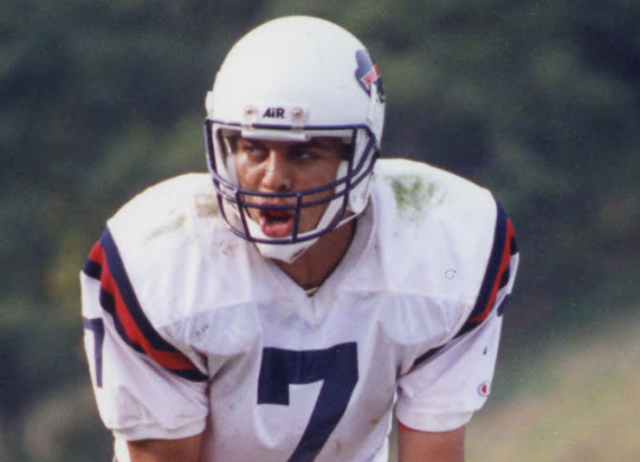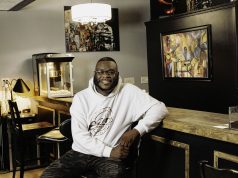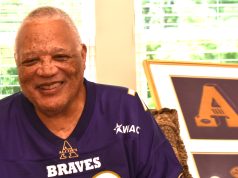By Donald Hunt | For The Birmingham Times
When you look at the history of the Black quarterbacks, it’s been a long road to success. For many years, the opportunities for African Americans to play this position were few and far between on the in college and professional football. Through hard work, perseverance and determination the doors started to open for them to occupy the most important position on the field.
In 1920, Fritz Pollard emerged as the first African American field general to play pro football. He played for the Akron Pros of the American Professional Football Association and guided the Pros to the league championship.
Willie Thrower was the first African American quarterback to play in the National Football League. In 1953, he played in one game for the Chicago Bears. In addition, he was the first Black quarterback to play in the Big Ten Conference leading Michigan to a national title in 1952.
The trailblazing efforts of Pollard and Thrower helped to pave the way for others. The same year Thrower made his appearance George Taliaferro became the first Black quarterback to start an NFL game. Taliaferro got his chance playing for the Baltimore Colts.
In 1960, Sandy Stephens guided the University of Minnesota to a national championship and started in the Rose Bowl. In 1966, Jimmy Raye started for Michigan State in the classic 10-10 tie with Notre Dame in the drive for No. 1 ranking in college football.
Marlin Briscoe made a huge mark as a rookie playing quarterback for the Denver Broncos in the American Football League (AFL). In 1968, Briscoe replaced quarterback Steve Tensi and five games and throwing 14 touchdowns.
In spite of the pioneering exploits, there were plenty of sacrifices made by African Americans to be signal callers. Warren Moon led the University of Washington to a 27-22 victory over Michigan to win the Rose Bowl in 1977. Moon was named the game’s Most Valuable Player. Although Moon was a major college football standout, he was not selected in the 1978 NFL Draft. To prove that he could perform at the pro level, he went to the Canadian Football League to play for the Edmonton Eskimos. He led Edmonton to five Grey Cup championships.
In 1984, he made his entry to the NFL by signing with the Houston Oilers. He played 17 seasons in the NFL with the Oilers (1984-1993), Minnesota Vikings (1994-1996), Seattle Seahawks (1997-1998) and the Kansas City Chiefs (1999-2000). He was named to nine Pro Bowls. He threw for an amazing 49,325 yards in his NFL career that includes 291 touchdowns. In 2006, Moon became the first Black quarterback inducted into the Pro Football Hall of Fame. He was also enshrined in the Canadian Football Hall of Fame.
Black quarterbacks have made some major strides in the NFL. Today there are 15 starting Black quarterbacks out of 32 teams.
Here is a list of Black college quarterbacks who have made a difference on the gridiron.
Joe “747” Adams, Tennessee State, 1977-80
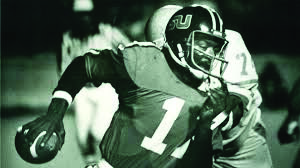 Tennessee State is well known for producing great quarterbacks like Joe Gilliam and Eldridge Dickey. Adams certainly established himself as a brilliant field general. He put up some big numbers in his college career. He threw for 8,643 yards and 75 TDs in his career. He was picked by the San Francisco 49ers in the 12th round of the NFL draft. Adams played for the Saskatchewan Roughriders, Toronto Argonauts and Ottawa Rough Riders in the CFL. He was inducted into the Black College Football Hall of Fame this year.
Tennessee State is well known for producing great quarterbacks like Joe Gilliam and Eldridge Dickey. Adams certainly established himself as a brilliant field general. He put up some big numbers in his college career. He threw for 8,643 yards and 75 TDs in his career. He was picked by the San Francisco 49ers in the 12th round of the NFL draft. Adams played for the Saskatchewan Roughriders, Toronto Argonauts and Ottawa Rough Riders in the CFL. He was inducted into the Black College Football Hall of Fame this year.
Charlie “Choo Choo” Brackins, 1951-54, Prairie View A&M
 Charlie “Choo Choo” Brackins is the first Black college quarterback to play in the NFL. In 1955, he played in a backup role against the Cleveland Browns. Brackins had an outstanding career at Prairie View A&M. He led the school to four consecutive Southwestern Athletic Conference championships from 1951-54. He had a 38-4 record as a starter with the Panthers. He was named All-American in 1953 and ’54.
Charlie “Choo Choo” Brackins is the first Black college quarterback to play in the NFL. In 1955, he played in a backup role against the Cleveland Browns. Brackins had an outstanding career at Prairie View A&M. He led the school to four consecutive Southwestern Athletic Conference championships from 1951-54. He had a 38-4 record as a starter with the Panthers. He was named All-American in 1953 and ’54.
Eldridge Dickey, Tennessee State, 1965-68
 Dickey was a three-time Black College All-American. He threw for 6,523 yards and 67 TDs. Dickey was an extremely accurate passer. In 1966, he led the Tigers to their first National Black College Football Championship. This team finished the season undefeated and untied. His nickname was “The Lord’s Prayer.” The Oakland Raiders selected Dickey making him the first Black quarterback chosen in the 1968 NFL/AFL draft. However, he never got a chance to play quarterback with the Raiders. He was converted to a wide receiver and played four years in Oakland. In 2012, he was enshrined in the Black College Football Hall of Fame.
Dickey was a three-time Black College All-American. He threw for 6,523 yards and 67 TDs. Dickey was an extremely accurate passer. In 1966, he led the Tigers to their first National Black College Football Championship. This team finished the season undefeated and untied. His nickname was “The Lord’s Prayer.” The Oakland Raiders selected Dickey making him the first Black quarterback chosen in the 1968 NFL/AFL draft. However, he never got a chance to play quarterback with the Raiders. He was converted to a wide receiver and played four years in Oakland. In 2012, he was enshrined in the Black College Football Hall of Fame.
Parnell Dickinson, Mississippi Valley State, 1972-75
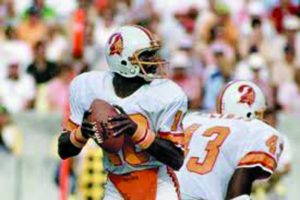 Parnell Dickinson led the SWAC in total offense for three years. He was named to the NAIA All-American team in 1972.Dickinson was also a two-time Black College All-American. In 1976, he was picked in the seventh round the Tampa Bay Buccaneers in the NFL draft. He played two seasons with the Buccaneers (1976-77). In 2017, he was inducted into the Black College Football Hall of Fame.
Parnell Dickinson led the SWAC in total offense for three years. He was named to the NAIA All-American team in 1972.Dickinson was also a two-time Black College All-American. In 1976, he was picked in the seventh round the Tampa Bay Buccaneers in the NFL draft. He played two seasons with the Buccaneers (1976-77). In 2017, he was inducted into the Black College Football Hall of Fame.
Bruce Eugene, Grambling State, 2002-05
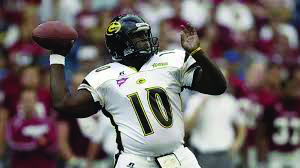 Eugene was 6-1 and 270 pounds playing under center and could really move and throw the ball down the field. His size, strength and quickness provided the fans with a lot of excitement. He reminded you of Charles Barkley. He was named the SWAC Offensive Player of the Year twice during his playing days at Grambling State. He finished as the Tigers’ all-time passing career leader and the second all-time passing career leader in the conference. Eugene amassed 13,530 total passing yards, 140 touchdowns, and just 38 interceptions in his college career. Eugene signed a free agent contract with the New Orleans Saints after completing his Grambling State career. The following year, he played pro football in Canada. He also signed a free agent contract with the Tampa Bay Buccaneers.
Eugene was 6-1 and 270 pounds playing under center and could really move and throw the ball down the field. His size, strength and quickness provided the fans with a lot of excitement. He reminded you of Charles Barkley. He was named the SWAC Offensive Player of the Year twice during his playing days at Grambling State. He finished as the Tigers’ all-time passing career leader and the second all-time passing career leader in the conference. Eugene amassed 13,530 total passing yards, 140 touchdowns, and just 38 interceptions in his college career. Eugene signed a free agent contract with the New Orleans Saints after completing his Grambling State career. The following year, he played pro football in Canada. He also signed a free agent contract with the Tampa Bay Buccaneers.
Joe Gilliam, Tennessee State, 1967-1971
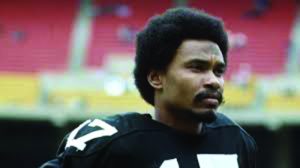 “Jefferson Street Joe” could really throw the ball down the field and had great presence in the pocket. During his playing days at Tennessee State, he led the Tigers to two straight Black College National titles in 1970 and ’71. He received All-American honors both years. He picked up the nickname “Jefferson Street Joe” because of the boulevard on the TSU campus. He threw for 5,213 yards and 50 touchdowns during his college career. In 1971, Gilliam was selected by the Pittsburgh Steelers in the 11th round of the NFL draft. During his time with the Steelers, he started six games posting a 4-1-1 record. In 2013, Gilliam was inducted into the Black College Football Hall of Fame.
“Jefferson Street Joe” could really throw the ball down the field and had great presence in the pocket. During his playing days at Tennessee State, he led the Tigers to two straight Black College National titles in 1970 and ’71. He received All-American honors both years. He picked up the nickname “Jefferson Street Joe” because of the boulevard on the TSU campus. He threw for 5,213 yards and 50 touchdowns during his college career. In 1971, Gilliam was selected by the Pittsburgh Steelers in the 11th round of the NFL draft. During his time with the Steelers, he started six games posting a 4-1-1 record. In 2013, Gilliam was inducted into the Black College Football Hall of Fame.
Aqeel Glass, Alabama A&M, 2017-21
 Glass threw for 12,136 yards, 109 TDs and 41 interceptions in 47 games. He was twice named Black College Player of the Year twice as well as the SWAC Offensive Player of the Year. In 2022, he signed the Tampa Bay Buccaneers and played in the team’s minicamp. He later signed with the New Orleans Breakers of the United States Football League.
Glass threw for 12,136 yards, 109 TDs and 41 interceptions in 47 games. He was twice named Black College Player of the Year twice as well as the SWAC Offensive Player of the Year. In 2022, he signed the Tampa Bay Buccaneers and played in the team’s minicamp. He later signed with the New Orleans Breakers of the United States Football League.
Quinn Gray, Florida A&M, 1999-2001
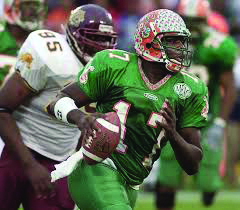 Gray threw for 7,378 yards and 57 TDs in his college career. In 2001, he threw for 407 yards against South Carolina State. That was one of the Rattlers’ top single-game passing performances. Gray led FAMU to four FCS playoff appearances, which included two consecutive Mid-Eastern Athletic Conference championships in 2000 and ’01. In 2002, Gray signed with the Jacksonville Jaguars. He spent five years with the Jaguars. He spent one season with the Houston Texans, Indianapolis Colts and the Kansas City Chiefs.
Gray threw for 7,378 yards and 57 TDs in his college career. In 2001, he threw for 407 yards against South Carolina State. That was one of the Rattlers’ top single-game passing performances. Gray led FAMU to four FCS playoff appearances, which included two consecutive Mid-Eastern Athletic Conference championships in 2000 and ’01. In 2002, Gray signed with the Jacksonville Jaguars. He spent five years with the Jaguars. He spent one season with the Houston Texans, Indianapolis Colts and the Kansas City Chiefs.
James “Shack” Harris, Grambling State, 1965-68
 Harris like Williams and so many other Grambling State players had the benefit of learning the game from legendary head coach Eddie Robinson. Harris had a magnificent career with the Tigers winning four Southwestern Athletic Conference championships and national title in 1967. Harris displayed a strong arm passing for 4,705 yards and 53 TDs. In 1969, Harris was drafted by the Buffalo Bills. Harris played with Buffalo from 1969-72. In 1973, he was picked up by the Los Angeles Rams where he really blossomed into a great quarterback under head coach Chuck Knox. Harris led the Rams to an NFC Western Division crown and became the first Black quarterback to start a conference title game. In 1975, Harris threw two TDs in the fourth quarter and was chosen MVP of the Pro Bowl. He finished his pro career with the San Diego Chargers. His groundbreaking accomplishments helped to elevate status of Black quarterbacks coming into the NFL.
Harris like Williams and so many other Grambling State players had the benefit of learning the game from legendary head coach Eddie Robinson. Harris had a magnificent career with the Tigers winning four Southwestern Athletic Conference championships and national title in 1967. Harris displayed a strong arm passing for 4,705 yards and 53 TDs. In 1969, Harris was drafted by the Buffalo Bills. Harris played with Buffalo from 1969-72. In 1973, he was picked up by the Los Angeles Rams where he really blossomed into a great quarterback under head coach Chuck Knox. Harris led the Rams to an NFC Western Division crown and became the first Black quarterback to start a conference title game. In 1975, Harris threw two TDs in the fourth quarter and was chosen MVP of the Pro Bowl. He finished his pro career with the San Diego Chargers. His groundbreaking accomplishments helped to elevate status of Black quarterbacks coming into the NFL.
Earl “Air” Harvey, North Carolina Central, 1985-88
 Harvey passed for more than 3,000 yards a s freshman at North Carolina Central. He set NCCU, CIAA and Division II marks for passing yards (10,621), career total offense (10,657) and career TD passes (86). Harvey was selected first-team All-CIAA for straight years. In 2020, he was inducted into the Black College Football Hall of Fame.
Harvey passed for more than 3,000 yards a s freshman at North Carolina Central. He set NCCU, CIAA and Division II marks for passing yards (10,621), career total offense (10,657) and career TD passes (86). Harvey was selected first-team All-CIAA for straight years. In 2020, he was inducted into the Black College Football Hall of Fame.
Tarvaris Jackson, Alabama State, 2003-05
 Jackson began his career at the University of Arkansas before transferring to Alabama State and played some big time football for the Hornets. He threw for 7,397 yards and 64 touchdowns during his three years at ASU. His junior year Jackson won the SWAC championship MVP while leading ASU to a 10-win season. As a senior, Jackson had a sensational year throwing for 2,655 yards and 25 TDs. He had just five interceptions that year. He also displayed his running ability gaining 271 yards. In 2006, Jackson was selected by the Minnesota Vikings in the second round of the NFL draft. He played five seasons with the Vikings (2006-11). After that, he spent one season with the Buffalo Bills (2012) and four seasons (2011, 2013, 2014, 2015) with the Seattle Seahawks. He was the backup quarterback to Russell Wilson on the Seahawks’ Super Bowls XLVIII championship team. Jackson was killed in a car accident in 2020.
Jackson began his career at the University of Arkansas before transferring to Alabama State and played some big time football for the Hornets. He threw for 7,397 yards and 64 touchdowns during his three years at ASU. His junior year Jackson won the SWAC championship MVP while leading ASU to a 10-win season. As a senior, Jackson had a sensational year throwing for 2,655 yards and 25 TDs. He had just five interceptions that year. He also displayed his running ability gaining 271 yards. In 2006, Jackson was selected by the Minnesota Vikings in the second round of the NFL draft. He played five seasons with the Vikings (2006-11). After that, he spent one season with the Buffalo Bills (2012) and four seasons (2011, 2013, 2014, 2015) with the Seattle Seahawks. He was the backup quarterback to Russell Wilson on the Seahawks’ Super Bowls XLVIII championship team. Jackson was killed in a car accident in 2020.
Steve McNair, Alcorn State, 1990-92
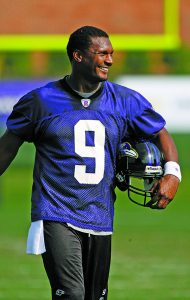 McNair was one of the top quarterbacks in college football and is the only player in NCAA history to gain more than 16,000 yards (16,823) in total offense during his career. McNair set a collegiate record by averaging 400.55 yards in total offense and became only the third player in Division I-AA (FCS) to throw 100 touchdowns in a career (119). He won the Walter Payton Award (top FCS player) and the Eddie Robinson Trophy (top Black college player). In 1994, he finished third in the Heisman Trophy award. McNair was the third overall selection by the Houston Oilers in the 1995 NFL draft. He played 13 years in the NFL. McNair, a three-time Pro Bowler, was named co-MVP of the NFL with Peyton Manning. He played for the Oilers (1995-96), Tennessee Titans (1997-2004) and Baltimore Ravens (2006-07). McNair threw for 31,304 yards and 174 touchdowns in his NFL career. In 2012, he was inducted into the Black College Football Hall of Fame. In 2020, he was enshrined in the College Football Hall of Fame.
McNair was one of the top quarterbacks in college football and is the only player in NCAA history to gain more than 16,000 yards (16,823) in total offense during his career. McNair set a collegiate record by averaging 400.55 yards in total offense and became only the third player in Division I-AA (FCS) to throw 100 touchdowns in a career (119). He won the Walter Payton Award (top FCS player) and the Eddie Robinson Trophy (top Black college player). In 1994, he finished third in the Heisman Trophy award. McNair was the third overall selection by the Houston Oilers in the 1995 NFL draft. He played 13 years in the NFL. McNair, a three-time Pro Bowler, was named co-MVP of the NFL with Peyton Manning. He played for the Oilers (1995-96), Tennessee Titans (1997-2004) and Baltimore Ravens (2006-07). McNair threw for 31,304 yards and 174 touchdowns in his NFL career. In 2012, he was inducted into the Black College Football Hall of Fame. In 2020, he was enshrined in the College Football Hall of Fame.
Shedeur Sanders, Jackson State/Colorado, 2021-22
 Sanders played two seasons at Jackson State before heading to the University of Colorado. Sanders played for his dad head coach Deion Sanders with the Tigers. Shedeur and his brother safety Shilo Sanders and wide receiver and defensive back Travis Hunter brought a lot of national attention to Jackson State and HBCU football. Sanders led Jackson State to a 23-3 record in those two seasons. The Tigers won two SWAC titles and played in two Celebration Bowls during that time. In two years, he threw for 6,983 yards and 70 TDs and only 14 interceptions. His ability to stand in the pocket and throw the ball down the field makes him a major NFL prospect. Coach Prime has given him the platform to showcase his talents. Sanders is showing the people in Boulder what the fans in the SWAC saw on a regular basis. And it looks like the overflowing crowds at the Buffaloes’ games have enjoyed watching him. He is currently the fourth leading passer in NCAA Division I football with 2,018 yards with 17 TDs and just four interceptions.
Sanders played two seasons at Jackson State before heading to the University of Colorado. Sanders played for his dad head coach Deion Sanders with the Tigers. Shedeur and his brother safety Shilo Sanders and wide receiver and defensive back Travis Hunter brought a lot of national attention to Jackson State and HBCU football. Sanders led Jackson State to a 23-3 record in those two seasons. The Tigers won two SWAC titles and played in two Celebration Bowls during that time. In two years, he threw for 6,983 yards and 70 TDs and only 14 interceptions. His ability to stand in the pocket and throw the ball down the field makes him a major NFL prospect. Coach Prime has given him the platform to showcase his talents. Sanders is showing the people in Boulder what the fans in the SWAC saw on a regular basis. And it looks like the overflowing crowds at the Buffaloes’ games have enjoyed watching him. He is currently the fourth leading passer in NCAA Division I football with 2,018 yards with 17 TDs and just four interceptions.
Wille “Satellite” Totten, Mississippi Valley State, 1982-85
 In 1984, he and Hall of Fame wide receiver Jerry Rice were nothing short of fantastic under the direction of Archie Cooley. Totten received first-team All-American honors while throwing for an incredible 4,557 yards and tossing a record 58 touchdowns that season. The Delta Devils averaged 59 points a game. He set over 50 Division I-AA (FCS) passing marks. Totten is the Division I-AA all-time leader and ranks second in career passing yards with 12,711. He threw 139 TDs in his college career. MVSU was the talk of college football during his career with the team’s offensive explosion. After his playing days with the Delta Devils, he played the Canadian Football League and the Arena League. He also played one season with the Buffalo Bills in 1987. Totten was inducted into the Black College Football Hall of Fame as well as the College Football Hall of Fame.
In 1984, he and Hall of Fame wide receiver Jerry Rice were nothing short of fantastic under the direction of Archie Cooley. Totten received first-team All-American honors while throwing for an incredible 4,557 yards and tossing a record 58 touchdowns that season. The Delta Devils averaged 59 points a game. He set over 50 Division I-AA (FCS) passing marks. Totten is the Division I-AA all-time leader and ranks second in career passing yards with 12,711. He threw 139 TDs in his college career. MVSU was the talk of college football during his career with the team’s offensive explosion. After his playing days with the Delta Devils, he played the Canadian Football League and the Arena League. He also played one season with the Buffalo Bills in 1987. Totten was inducted into the Black College Football Hall of Fame as well as the College Football Hall of Fame.
Jay “Sky” Walker, Howard University, 1992-1993
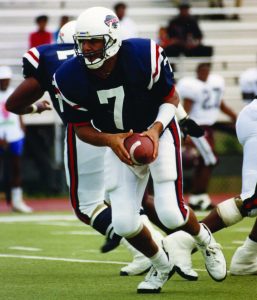 Jay Walker started his career at Long Beach State, but transferred to Howard University. Walker played just two years with the Bison. His two seasons were very impressive. He received All-Mid-Eastern Athletic Conference recognition in in 1992 and ’93. In addition, he named the Offensive Player of the Year. Walker guided Howard to an undefeated season in 1993 capturing the MEAC title and the Black College National Championship. During Walker’s college career, he and Steve “Air” McNair were two of the best quarterbacks in the country. Walker is the Bison single season leader in passing yardage with 3,508 and pass completions with 223. In 1994, he was selected by the New England Patriots in the seventh round of the NFL draft. He played two seasons with the Patriots prior to playing for the Minnesota Vikings where he played two seasons. Walker is a color analyst for HBCU football on ESPN.
Jay Walker started his career at Long Beach State, but transferred to Howard University. Walker played just two years with the Bison. His two seasons were very impressive. He received All-Mid-Eastern Athletic Conference recognition in in 1992 and ’93. In addition, he named the Offensive Player of the Year. Walker guided Howard to an undefeated season in 1993 capturing the MEAC title and the Black College National Championship. During Walker’s college career, he and Steve “Air” McNair were two of the best quarterbacks in the country. Walker is the Bison single season leader in passing yardage with 3,508 and pass completions with 223. In 1994, he was selected by the New England Patriots in the seventh round of the NFL draft. He played two seasons with the Patriots prior to playing for the Minnesota Vikings where he played two seasons. Walker is a color analyst for HBCU football on ESPN.
Johnnie Walton, 1965-68, Elizabeth City State
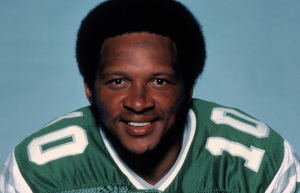 Walton was an All-CIAA (Central Intercollegiate Athletic Association) selection his senior year. He threw for 1,400 yards and 16 TDs while leading the Vikings to an 8-1 slate. Walton was a good pocket passer and could put the ball on the money. In spite of his talents, Walton was not selected in the 1969 NFL draft. Walton played in the Continental Football League, World Football League and the United States Football League. He played well in each league. He won a championship in the CFL. He did sign with the Los Angeles Rams (1969-72). But Walton had a real good run with the Philadelphia Eagles (1976-79). He paved the way for many of the Eagles’ Black quarterbacks — Randall Cunningham, Rodney Peete, Donovan McNabb, Michael Vick and Jalen Hurts. Walton received national exposure for coming off the bench to replace an injured quarterback Ron Jaworski throwing a 29-yard TD pass to wide receiver Charlie Smith to help the Eagles defeat the Dallas Cowboys, 31-21, on Monday Night Football. Walton was inducted into the Black College Football Hall of Fame in 2023.
Walton was an All-CIAA (Central Intercollegiate Athletic Association) selection his senior year. He threw for 1,400 yards and 16 TDs while leading the Vikings to an 8-1 slate. Walton was a good pocket passer and could put the ball on the money. In spite of his talents, Walton was not selected in the 1969 NFL draft. Walton played in the Continental Football League, World Football League and the United States Football League. He played well in each league. He won a championship in the CFL. He did sign with the Los Angeles Rams (1969-72). But Walton had a real good run with the Philadelphia Eagles (1976-79). He paved the way for many of the Eagles’ Black quarterbacks — Randall Cunningham, Rodney Peete, Donovan McNabb, Michael Vick and Jalen Hurts. Walton received national exposure for coming off the bench to replace an injured quarterback Ron Jaworski throwing a 29-yard TD pass to wide receiver Charlie Smith to help the Eagles defeat the Dallas Cowboys, 31-21, on Monday Night Football. Walton was inducted into the Black College Football Hall of Fame in 2023.
Ted White, Howard University, 1995-98
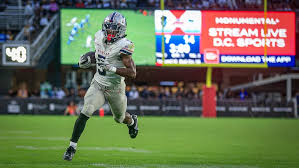 1996, White was selected as the MEAAC Offensive Player of the Year while being named first-team Division I-AA (FCS) All-American in 1996 and 1998. He set conference marks for passing yards with 9,808 yards and passing TDs with 92. White played briefly with the Jacksonville Jaguars, Tampa Bay Buccaneers and the Kansas City Chiefs. He also had brief stints in NFL Europe and in the Canadian Football League.
1996, White was selected as the MEAAC Offensive Player of the Year while being named first-team Division I-AA (FCS) All-American in 1996 and 1998. He set conference marks for passing yards with 9,808 yards and passing TDs with 92. White played briefly with the Jacksonville Jaguars, Tampa Bay Buccaneers and the Kansas City Chiefs. He also had brief stints in NFL Europe and in the Canadian Football League.
Doug Williams, Grambling State, 1974-77
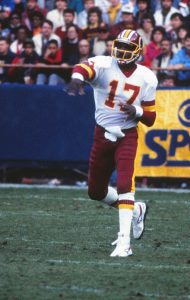 Williams put together a marvelous performance leading the Washington Redskins (now Washington Commanders) in 1988 to a 42-10 victory over the Denver Broncos in Super Bowl XXII. Williams became the first Black quarterback to win a Super Bowl. He not only won the biggest game of the year, but Williams set four Super Bowl records – most yards passing in a game (340), most yards passing in a quarter (228), most touchdown passes (four) and longest completion (80 yards).
Williams put together a marvelous performance leading the Washington Redskins (now Washington Commanders) in 1988 to a 42-10 victory over the Denver Broncos in Super Bowl XXII. Williams became the first Black quarterback to win a Super Bowl. He not only won the biggest game of the year, but Williams set four Super Bowl records – most yards passing in a game (340), most yards passing in a quarter (228), most touchdown passes (four) and longest completion (80 yards).
Williams, a first-team All-American in 1977, finished fourth in the Heisman Trophy voting. He was named MVP of the East-West Shrine Game. Grambling State had a 35-5 record as a collegiate standout. During his college career, he passed for 8,411 yards and 93 touchdowns. In 1978, he was a first-round pick of the Tampa Bay Buccaneers. He became the first Black quarterback to have a big impact in the NFL. He played for the Buccaneers from 1978-82, starting 33 of that team’s first 36 NFL victories, and took them to the playoffs in 1979 and 1981.
Updated at 12:34 p.m. on 10/26/2024 to provide correct photo of Johnnie Walton.


